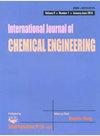Analysis Study of Available Alternatives for Mitigation of Aromatic Hydrocarbon Emissions from a Glycol Dehydration Unit
IF 2.4
4区 工程技术
Q3 ENGINEERING, CHEMICAL
引用次数: 0
Abstract
A natural gas (NG) dehydration unit based on glycol absorption is considered one of the most important gas processing units, aiming to decrease water content and consequently adjust its dew point. However, during this process, not only water is absorbed by the glycol solvent, but also some aromatic compounds, including benzene, toluene, ethylbenzene, and xylene (BTEX), in addition to volatile organic compounds (VOC), are absorbed. These compounds are released during glycol regeneration into the atmosphere, resulting in environmental pollution and consequent catastrophic mental and physical health problems. This study aims to minimize BTEX emissions while ensuring efficient dew point control. Various strategies have been adopted to control BTEX emissions, but the present work focuses on optimizing operating conditions and investigating the influence of operational variables on BTEX emissions, as well as NG water content. LINGO optimization software and HYSYS (version 11) are used to find the plant’s optimum conditions for minimizing BTEX emissions and satisfying efficient dew point control. Simulation results show that stripping gas, triethylene glycol (TEG) circulation rate, and inlet feed gas temperature significantly affect BTEX emissions. The proposed optimum operating conditions in this work resulted in a reduction in BTEX emissions by about 81% while satisfying the required NG dew point. Furthermore, two quadratic equations are developed based on regression analysis for efficient calculation of the BTEX emissions and water dew point at any operational variables.缓解乙二醇脱水装置芳香烃排放的可用替代品分析研究
基于乙二醇吸收的天然气(NG)脱水装置被认为是最重要的天然气处理装置之一,其目的是降低含水量,从而调整露点。然而,在此过程中,乙二醇溶剂不仅会吸收水分,还会吸收一些芳香族化合物,包括苯、甲苯、乙苯和二甲苯(BTEX),以及挥发性有机化合物(VOC)。这些化合物会在乙二醇再生过程中释放到大气中,造成环境污染,进而引发灾难性的身心健康问题。本研究旨在最大限度地减少 BTEX 排放,同时确保有效的露点控制。控制 BTEX 排放的策略多种多样,但本研究的重点是优化操作条件,研究操作变量对 BTEX 排放和 NG 含水量的影响。采用 LINGO 优化软件和 HYSYS(第 11 版)来寻找工厂的最佳条件,以最大限度地减少 BTEX 排放并满足有效的露点控制。模拟结果表明,汽提气、三甘醇(TEG)循环速率和入口原料气温度对 BTEX 排放有显著影响。这项工作中提出的最佳运行条件使 BTEX 排放量减少了约 81%,同时满足了所需的 NG 露点要求。此外,还根据回归分析建立了两个二次方程,用于有效计算任何运行变量下的 BTEX 排放量和水露点。
本文章由计算机程序翻译,如有差异,请以英文原文为准。
求助全文
约1分钟内获得全文
求助全文
来源期刊

International Journal of Chemical Engineering
Chemical Engineering-General Chemical Engineering
CiteScore
4.00
自引率
3.70%
发文量
95
审稿时长
14 weeks
期刊介绍:
International Journal of Chemical Engineering publishes papers on technologies for the production, processing, transportation, and use of chemicals on a large scale. Studies typically relate to processes within chemical and energy industries, especially for production of food, pharmaceuticals, fuels, and chemical feedstocks. Topics of investigation cover plant design and operation, process design and analysis, control and reaction engineering, as well as hazard mitigation and safety measures.
As well as original research, International Journal of Chemical Engineering also publishes focused review articles that examine the state of the art, identify emerging trends, and suggest future directions for developing fields.
 求助内容:
求助内容: 应助结果提醒方式:
应助结果提醒方式:


